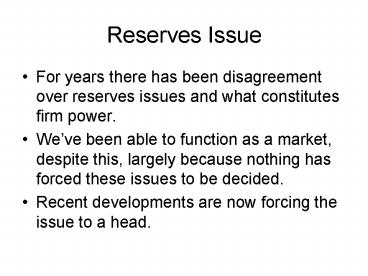Reserves Issue PowerPoint PPT Presentation
1 / 12
Title: Reserves Issue
1
Reserves Issue
- For years there has been disagreement over
reserves issues and what constitutes firm power. - Weve been able to function as a market, despite
this, largely because nothing has forced these
issues to be decided. - Recent developments are now forcing the issue to
a head.
2
Letter from WECC MIC to WSPP EC and OC Chairs
- Upcoming changes to contingency reserve
responsibility. - Two objectives of the letter
- Inform the members of the issue
- Request that WSPP evaluate actions available to
WSPP that would mitigate market (and reliability)
impacts. - Encourages resolution of short-term issue
(December 4) and long-term issues.
3
What the Agreement says
- Service Schedule C
- C-3.10 Seller shall be responsible for ensuring
that Service Schedule C transactions are
scheduled as firm power consistent with the most
recent rules adopted by the applicable NERC
regional reliability council. - For years weve had tacit agreement over what the
WECC rules were. Now they have changed.
4
WECC Interpretation of Load Responsibility
- Approved on September 7, 2007
- Energy product definitions are determined by the
entities that are parties to the transaction. - It is up to Purchasing Selling Entities to
determine their level of acceptable
deliverability risk and determine who has
contingency reserve responsibility.
5
INT-BPS-014-0 (Identification of Contingency
Reserve Responsibilities in the e-Tag)
- B. Requirements
- WR1. When both the Source and Sink Balancing
Authorities (BAs) are within the Western
interconnection, e-Tag Authors will identify the
BA or Reserve Sharing Group member responsible
for including the transaction in their
calculation of Contingency Reserve requirements.
This entity will be referred to as the
Responsible Entity. Only one selection will be
made.
6
INT-BPS-014-0 (Identification of Contingency
Reserve Responsibilities in the e-Tag)
- C. Measures
- WM1. Interchange Authorities will provide
evidence that they only accept e-Tags containing
the Responsible Entity. - WM2. Balancing Authoritieswill provide evidence
of correctly adjusting their Contingency Reserve
Obligations by the amounts shown on the
implemented e-Tag.
7
NWPP Response
- NWPP RSG members (if the source) will not carry
reserves for exports outside the NWPP unless the
e-Tag states otherwise. - NWPP RSG members (if the sink) will carry
reserves for imports into the NWPP unless the
e-Tag states otherwise. - For transactions in the NW where the source and
sink are NWPP RSG members, the source BA will
carry the reserve responsibility.
8
California/BPA situation
- Sellers claim they can not arrange to provide
reserves, as this is a function of the ISO. - ISO is the BA for many of the transactions
originating in California. - BPA claims its merchant can not obligate its BA
to provide reserves for sales. It can for
purchases, as the sink BA is the provider of last
choice for reserves.
9
What the Agreement says
- Operating Procedure No. 1
- Requires sending control area to notify receiving
control area (and all intermediaries) of the
reserve responsibility. - Seller, if different from the sending control
area, shall notify sending control area. - Buyer, if different from the receiving control
area, shall notify the receiving control area.
10
ICE issue
- Significant quantity of preschedule and term
trades done on ice. - Does not specify who carries reserves.
- Do not know who your counterparty is until
transaction is consummated. - Discussions with ICE.
11
Actions available to WSPP
- Amend the contract to have a default, with the
ability to agree otherwise. - Amend the contract to have different default
provisions specific to different
regions/transaction. - Post a list of members on the website who
interpret the agreement a certain way. - (ICE interface)
- Let market forces shape itself.
12
At a minimum
- Get the word out campaign notifying members of
the issue. - Letter from Sempra.
- Long-term thinking next steps.

